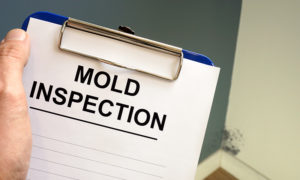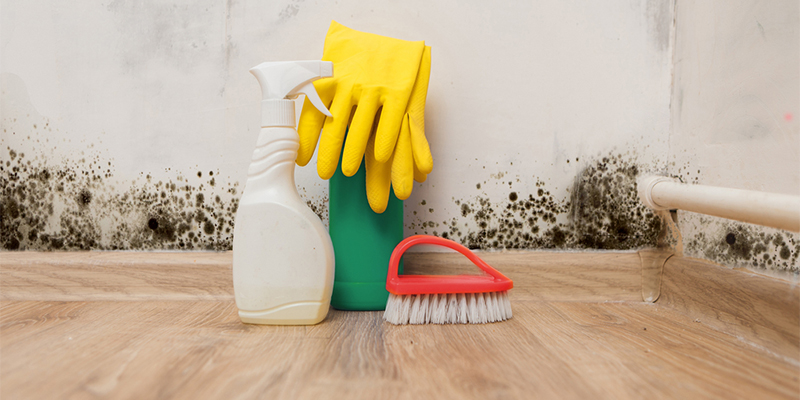Mold in apartments and other rentals can be very dangerous. If you are a tenant who suspects the presence of mold, it’s important to take the necessary steps as soon as possible. But who is responsible for removing mold in rental houses? Here’s what you need to know:
Mold in Apartment Rentals: Who Is Responsible for Removing It?
There are currently no federal laws, as well as very few state laws, that cover the landlord’s responsibility when it comes to mold or mold spores. However, according to the Implied Warranty of Habitability, landlords have a legal duty to maintain their rental property. They must ensure that a rental property is fit and livable for the entire duration of a tenant’s lease.
Landlords must address maintenance issues that could lead to excess moisture or mold issues for renters. This includes fixing leaky pipes, windows, or roofs throughout the rental property, as well as ensuring that exhaust fans in the kitchen and bathrooms are working properly. If the rental property is located in a humid climate, the landlord may also install dehumidifiers to prevent mold growth.
Landlords must also conduct regular property inspections to ensure that the rental units are fit and livable. Through regular inspections, landlords can make the necessary fixes to prevent mold growth in apartment units.
Are Landlords Responsible for Mold Caused by Tenants?
Mold growth can also be caused by a tenant’s own behavior. For example, excess moisture can build up if the tenant does not ventilate the apartment regularly or fails to maintain a level of cleanliness throughout the apartment.
Regardless of the cause of mold, the landlord is still responsible for addressing the issue and ensuring that the rental property is habitable. However, if the tenant caused mold growth, the landlord might charge you for expenses incurred or deduct from your security deposit.
Mold in Apartment Tenants Rights: Make Sure to Check Your Lease Agreement
Since there are no clear-cut regulations when it comes to mold in rental property, most landlords will include relevant clauses in their lease agreements, or even have a lease addendum for mold. While landlords are still responsible for removing mold in a rental house, these provisions can relieve them from potential liabilities.
In a typical lease agreement or mold lease addendum, a landlord will inform the dangers of mold and the importance of mold prevention. Upon signing the contract, the tenant acknowledges that the rental unit is clean and free of mold prior to moving in. The tenant also agrees to employ strategies that will prevent the growth of mold in apartments — such as using exhaust fans, opening windows, and cleaning the rental property regularly.
Is Landlord Responsible for Mold Testing?
Some landlords may offer free mold inspections for renters prior to moving in. It’s helpful to have a move-in checklist so that both landlord and tenant can establish the condition of the rental property.
Based on the findings of the apartment mold inspection, the tenant can ask the landlord to make the necessary changes prior to moving in. It is important to know the correlation between mold and tenants’ rights as written within the agreement.
What Do I Do If I Suspect Mold in My Apartment?
If a tenant suspects that there is mold in the apartment, it is his/her responsibility to inform the landlord as soon as possible. In turn, it is the landlord’s responsibility to ensure that the mold issue is addressed properly and within a reasonable time frame. In cases of black mold in a rental house, landlords must act with urgency due to the potential health risks.
Frequently Asked Questions About Mold in Apartment Rentals
To further understand the responsibilities of both landlords and tenants, here are answers to frequently asked questions about mold in apartments and other rental properties.
 How Can I Test My Apartment for Mold?
How Can I Test My Apartment for Mold?
Tenants should stay vigilant when it comes to mold in apartments.
Be on the lookout for mold in apartment symptoms such as water spots or suspicious stains, a musty or moldy smell, and leaky pipes. If you have been experiencing allergic symptoms, headaches, or difficulty breathing, it may be mold.
Make sure to alert your landlord as soon as possible. Your landlord can inspect the rental unit and test for the presence of mold. Alternatively, if the landlord does not know how to test for mold in the apartment, they can outsource it to a third-party professional.
What Can I Do If My Landlord Won’t Fix Mold Problem?
Before taking any action against your landlord, make sure to check your lease agreement for how to deal with mold. If the landlord has clearly broken the terms of the lease agreement, specifically when it comes to fixing the mold problem, the tenant may pursue further action. For example, you can consider reporting black mold in apartments to the health department or other local agencies. Your city or county can then contact the landlord and have them fix the mold issue.
Can I Refuse to Pay Rent If There is Mold?
Tenants cannot simply refuse to pay rent if there is mold in the apartment. You must first check state and local laws, as well as the terms of your lease. Tenants must also ensure that they take the proper steps of dealing with mold — such as providing proper notice to the landlord. If the landlord fails to act within a reasonable time frame, the tenant might be able to withhold rent, break the lease early, or file a lawsuit for mold-related health issues.
Can You Sue for Mold Exposure in Apartment?
If your landlord fails to address the mold problem and it leads to health problems, you might be able to sue. Given the potential health risks, there have been many mold lawsuit settlements throughout the country. Lawsuits can be lengthy, though, with no immediate results. As such, it’s up to the tenant to decide whether to sue or not. If you have renter’s insurance, you might have coverage for tenant relocation due to mold. This can offset some of the expenses if you decide to leave the rental property.
What to Do If My Apartment Has Mold?
If your apartment has mold, the first step is to inform your landlord. It is the landlord’s responsibility to remove mold in apartment units. However, tenants must not forget that they have responsibilities as well. You must keep the rental property is clean and well-maintained. Combined with regular inspections from your landlord, this will prevent mold from growing in the first place.
Are you a landlord who needs help dealing with mold in apartments or any other maintenance issue? Consider the benefits of hiring a property manager. Feel free to browse the Rental Choice online directory to find the best property management companies in your area!
RELATED ARTICLES:
- 15 Key Questions To Ask A Landlord Before Renting
- What Are The Legal Liabilities Of Property Managers
- Yard Maintenance And Landscaping For Rental Property




 Company
Company